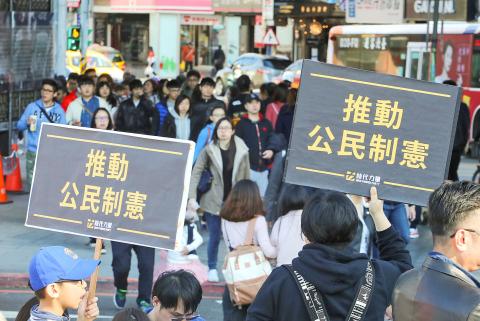The New Power Party (NPP) yesterday began a referendum drive to scrap newly approved amendments to the Labor Standards Act (勞動基準法), legislate for a minimum wage bill and require the president to call a national affairs conference to draft a new constitution.
The party is waging a campaign on the streets for three separate referendum topics: requiring the legislature to scrap the labor amendments approved on Wednesday last week and restart the legislation process; establishing a minimum wage law stipulating a salary that can sustain basic living needs; and requiring the president to convene a national affairs conference to formulate a new constitution, which would subsequently require referendum approval.
Following the passage of the labor amendment, the NPP on Friday last week announced that it was adding the labor referendum petition to its referendum drive on a living wage and a new constitution.

Photo: CNA
In a week, the party plans to collect 1,879 signatures — about 0.001 percent of the voter turnout in the last presidential election — for each referendum topic and submit them to the Central Election Commission, before collecting 280,000 signatures — about 1.5 percent of the eligible voters in the most recent presidential election — for each topic in the coming months to initiate the referendum.
“The amendments approved by the Legislative Yuan are worse than the Cabinet proposals. [The Cabinet] said its proposals were to allow workers to work overtime to improve low wage conditions,” NPP Executive Chairman Huang Kuo-chang (黃國昌) said. “The claim is unacceptable, but even more unacceptable is the final version approved by the Legislative Yuan, which will allow [employers] to give compensatory leave in lieu of overtime pay.”
The public should join the referendum drive to abolish the labor amendments and improve working conditions, Huang said.
Asked if the party would stick to the set of “expedient” labor amendments that it proposed on Monday last week, which has a striking resemblance to the Cabinet amendments should the labor law referendum be approved, NPP Legislator Hsu Yung-ming (徐永明) said the party was still undecided.
The party plans to assess public opinion during the course of the referendum and propose bills accordingly, Hsu said.
The NPP in April 2016 proposed a draft minimum wage bill, which stipulated a minimum monthly salary of NT$26,867, but the bill has been shelved without undergoing any review, Huang added, calling for a minimum wage act to protect labor rights.
Meanwhile, Huang and Hsu denied a media report alleging that a division had sprung up among NPP lawmakers over the referendum drive, as “dovish” NPP lawmakers Hung Tzu-yung (洪慈庸), Freddy Lim (林昶佐) and Kawlo Iyun Pacidal were reportedly against the labor law referendum proposal.
They were absent from yesterday’s campaigning.
Hsu said the lawmakers’ absence was due to scheduling conflicts and added that the labor law referendum proposal was approved by the NPP’s decisionmaking body.
Meanwhile, the party plans to put forward a list of 20 councilor candidates as the first series of its nominations for the year-end mayoral and councilor elections.

The manufacture of the remaining 28 M1A2T Abrams tanks Taiwan purchased from the US has recently been completed, and they are expected to be delivered within the next one to two months, a source said yesterday. The Ministry of National Defense is arranging cargo ships to transport the tanks to Taiwan as soon as possible, said the source, who is familiar with the matter. The estimated arrival time ranges from late this month to early next month, the source said. The 28 Abrams tanks make up the third and final batch of a total of 108 tanks, valued at about NT$40.5 billion

Travel agencies in Taiwan are working to secure alternative flights for travelers bound for New Zealand for the Lunar New Year holiday, as Air New Zealand workers are set to strike next week. The airline said that it has confirmed that the planned industrial action by its international wide-body cabin crew would go ahead on Thursday and Friday next week. While the Auckland-based carrier pledged to take reasonable measures to mitigate the impact of the workers’ strike, an Air New Zealand flight arriving at Taipei from Auckland on Thursday and another flight departing from Taipei for Auckland on Saturday would have to

A group from the Taiwanese Designers in Australia association yesterday represented Taiwan at the Midsumma Pride March in Melbourne. The march, held in the St. Kilda suburb, is the city’s largest LGBTQIA+ parade and the flagship event of the annual Midsumma Festival. It attracted more than 45,000 spectators who supported the 400 groups and 10,000 marchers that participated this year, the association said. Taiwanese Designers said they organized a team to march for Taiwan this year, joining politicians, government agencies, professionals and community organizations in showing support for LGBTQIA+ people and diverse communities. As the first country in Asia to legalize same-sex

MOTIVES QUESTIONED The PLA considers Xi’s policies toward Taiwan to be driven by personal considerations rather than military assessment, the Epoch Times reports Chinese President Xi Jinping’s (習近平) latest purge of the Chinese People’s Liberation Army (PLA) leadership might have been prompted by the military’s opposition to plans of invading Taiwan, the Epoch Times said. The Chinese military opposes waging war against Taiwan by a large consensus, putting it at odds with Xi’s vision, the Falun Gong-affiliated daily said in a report on Thursday, citing anonymous sources with insight into the PLA’s inner workings. The opposition is not the opinion of a few generals, but a widely shared view among the PLA cadre, the Epoch Times cited them as saying. “Chinese forces know full well that